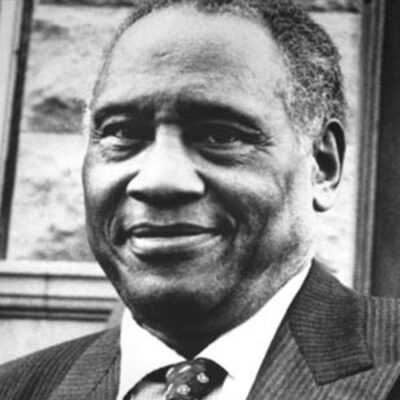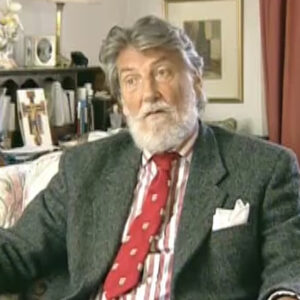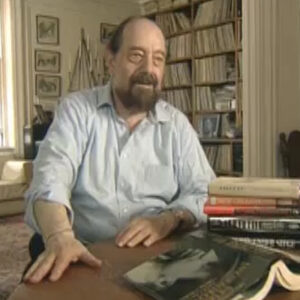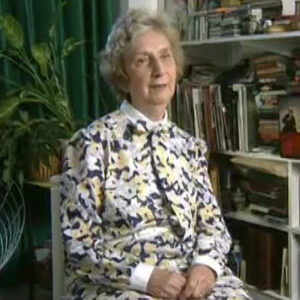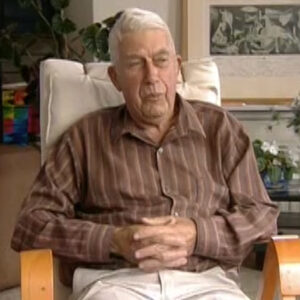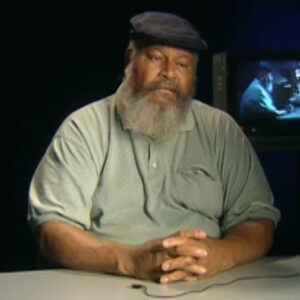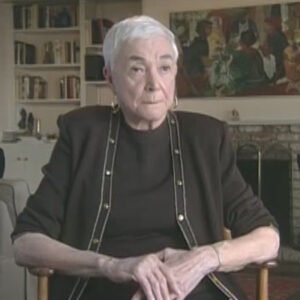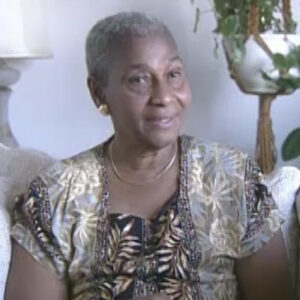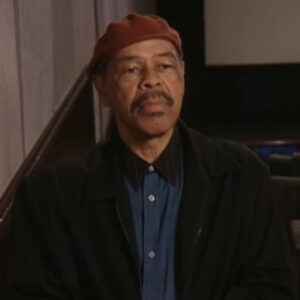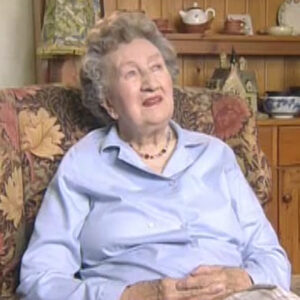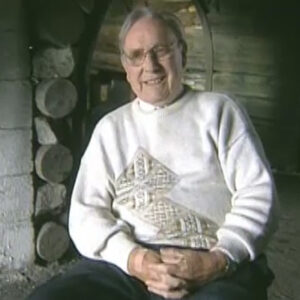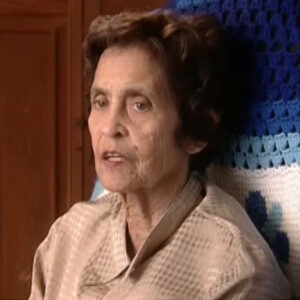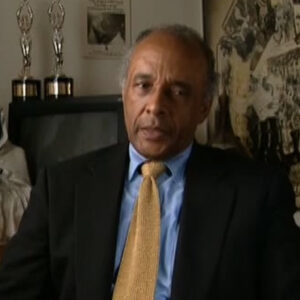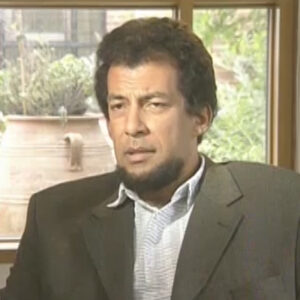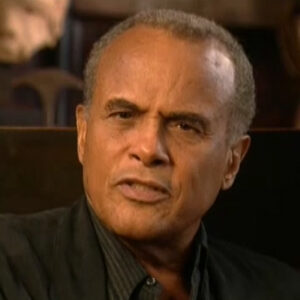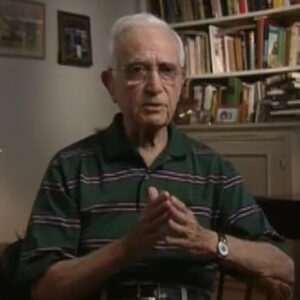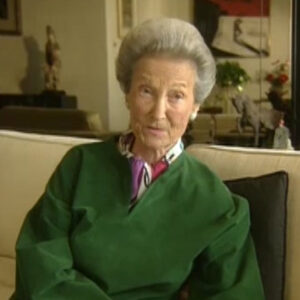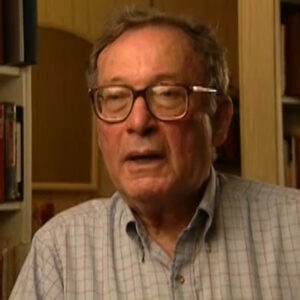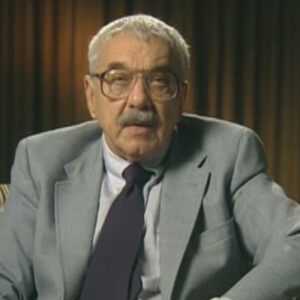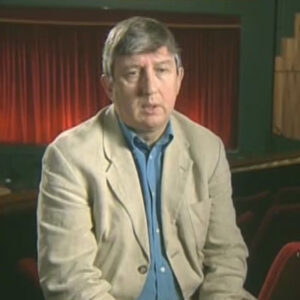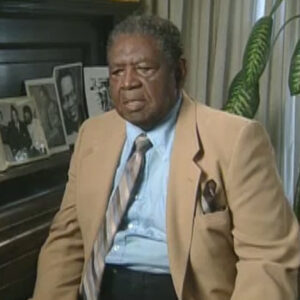Speaker For the past 15 years, I’ve been a professor of history at Rutgers University in New Brunswick, and it seems to me that most of that time I’ve been I’ve been trying to finish writing The Life and Times of WBB Dubois.
Speaker I started writing in about 1990, and the first volume of this two volume biography appeared in 1994 and was critically well-received. I’m now working on volume two and I hope to finish within the next six months. And the covers of time we’re talking about is really much of the 20th century from postwar reconstruction. Dubois was born in 1868 to his death during the the March on Washington, in fact, the eve of the march on Washington in August of 1963, and obviously much of Dubois’s life intersect. So he was an older man by some 20 years. And Robson’s much of his life intersects with with the of Paul Robeson’s OK.
Speaker Could straighten out his tie a little bit and just straighten out.
Speaker The time is right. Right. So I should wear a bow tie like Arthur Schlesinger said. Yeah, OK. Now so.
Speaker What the conversation we’re going to have is I need the life and I really need the times of Paul Robeson to have the life, but why he did the things that he did and what was happening in certain parts, like, for example.
Speaker Uh.
Speaker How the polls first trip to Russia, how did it impact them?
Speaker I mean, was it was it significant in terms of his political life or the ropes and went went to the Soviet Union for the first time in in nineteen thirty four. And the impact on on him was transforming. You certainly can’t say that I hesitated only because going to the Soviet Union from 1920 to 1940 was inevitable. It seems a transforming impact on people. Intellectuals who went to the Soviet Union came away of one of two minds. Either that this was Lincoln Steffens famously said the future at work or that it was is, as Bertrand Russell said, an enormity, an idea gone wrong ropes and clearly was in the former category of those who thought that this was a an experiment that would produce a degree of justice, economic and social unparalleled, to be sure, with ropes.
Speaker And there was also a personal element at play, I think more pressingly than would have been true of European Europeans going in.
Speaker That was racism in his own country. And I think it’s probably not without significance, although it’s a tad speculative that a love affair that Robeson was was hot and heavy into had ended painfully for him. A British aristocrat had, at the end of the day, withdrawn from from the relationship. And it was attended by a degree of criticism in the British press. And he was, in fact, subjected to a bit of social discrimination, which he had not encountered in London. And that had to do with with this affair and perhaps one other. And so he arrives in the Soviet Union, having found that the welcoming British public to see him not only as an actor, enormously talented, but as a black man, not quite free to do in his personal life what other talented men and women could do. And he transit’s he transit’s to Russia through the Third Reich and changes trains in Berlin. And there is in one account and I simply relate the account because it is so graphic. It’s exact authenticity may be somewhat debatable, but as as he moves from one train, from the train arriving to the train departing, he encounters SS troopers and there are exchanges of of hostile glances and ropes and simply pulls himself up to his full stature and walks with his wife passed and then the party and boards the train to Moscow. But here we have one experiment, the experiment that’s going to produce hell on earth in a matter of of years, and the Soviet Union, which seems to be a an experiment leading to a great justice when it went to Pakistan.
Speaker No, no. That will come much later.
Speaker Much later he arrives. And of course, he’s welcomed by what a reception group. Sergei Eisenstein, undoubtedly the the premier cinematographer of the 20th century, the tutera really of of D.W. Griffith. Robeson would not have liked the films that Griffith made, but one has to concede that Griffith was at his craft. Superb. And there Eisenstein and the wife of the minister of foreign affairs, Maxim.
Speaker Look, that’s one I didn’t turn off. Oh, that’s the facts. No doubt about that.
Speaker Let it come in. OK, well, um, what a reception. Oh oh oh oh.
Speaker Roseanne well, Cameron and OK, the reception committee consists of, as I said, of Sergei Eisenstein, the wife of the Minister of Foreign Affairs, Maxime lifting off and others and several African-Americans resident there in the capital.
Speaker Eisenstein apparently hoped to make a film of the life of Toussaint Louverture. And of course, Robeson would have been ideal cast in their part, they’re off and running to vodka and champagne and much conversation about politics and race and acting and, uh, uh, the, uh, the people he meets, Marshall Tuka Chayefsky, not Marshall at that point, but soon to be the chief of staff of the Soviet army. In other words, a range of important to interesting people give their time to signal to Paul Robeson that there is for him an agenda in the Soviet Union that will enrich his life and that will have an impact far beyond the theater.
Speaker It’s a question when he got there, how politically astute was he? I mean, did he understand the stuff that he was saying or was it just like a tourist?
Speaker How would you rate that?
Speaker I think in nineteen thirty four. Paul Robeson was not politically astute. That’s, I think, fair to say I’m an intelligent man, a Rutgers Phi Beta Kappa lawyer. Obviously, he he knew something of this this experiment. But as an actor and this is what he’s become as a performer, politics is is a bit of a bore, I suppose, to him. He’s been too busy living to to pay attention to the issues and the isms about him.
Speaker But I the chronology is is is not entirely clear to me. I think perhaps it would have been immediately after this first trip that he sets on a program of self self instruction. And in that pursuit to know more about Marxism and communism, he has the assistance of Clark James, a West Indian intellectual, a towering Trotskyist in his own right. And he reads the the sort of primer of the day on the Soviet Union by the the Web Sidney and Beatrice Webb, who had visited the Soviet Union in the early 20s.
Speaker So he wants to inform himself. And as I think is characteristic of Paul Robeson, I’m sure this will be borne out by your other interviewees. He sort of blitzed a project and he clearly did. I don’t have the list of books that came out of the library. I suppose Martin Duberman would have them or could could lay his hand to them. But he quite impressively informed himself about about the Soviet Union and what particularly as a as a as a lawyer gripped him was the Russian Constitution, Article 123, which stated in its categorical terseness the complete equality of all peoples in the Soviet Union and made racism an offence. And that spoke volumes to Robeson as it had to Langston Hughes, who had preceded Paul there by about two years going over in 1932.
Speaker What about, I believe, the poem that William Patterson in? In my state, I believe, right?
Speaker Yeah, I want to be sure when this is, he certainly did. I just don’t know when that he’s just written about it.
Speaker But in a way, I mean, whether it’s that period or not. What what effect did he have on ropes? And I mean. I know he was, you know, the government’s priority, you know, so.
Speaker I’m, uh, I’m just trying to see if I if I can’t pin down, I think they did meet as you think they did.
Speaker Uh, Patterson was at the hospital, I think when you said the, uh, that they know it’s earlier.
Speaker So I think he did not meeting, um. Paterson comes back in 19, 20. Nine from the from the Far East University in the school, so the William Patterson.
Speaker As the spokesman for the international the international labor defense, is that it international international child, the.
Speaker The isn’t that isn’t that stupid?
Speaker Well, William Patterson pretty well took charge of the propagandizing of the Scottsboro case. And as one of the officials of the ILD, he reached out for for Paul Robeson, they became quite close in during the 30s, but particularly after World War two from 1944 45 on. Patterson is increasingly a counselor for Paul and one of the small number of people to whom he goes for.
Speaker Critical advice, I don’t know what the.
Speaker Oh, the screen went off. We leave it off, it won’t happen again. Well, I’d rather keep it on to have it had to be delayed to, you know, delay that. Well, you could probably do that, but I can’t take too much time. That’s OK.
Speaker OK, yeah.
Speaker So William Patterson Patterson is is extremely important to the the the positions that that Paul articulated. I think it would be fair to say that Patterson does help articulate those positions. The the, um, uh, lobbying for a federal anti lynching law in the late 40s is is a Patterson issue that Paul quite enthusiastically signs on to support.
Speaker Uh.
Speaker I think there were many people, in fact, who thought that. The closeness to Patterson hindered somewhat Paul’s splendid talent as a as a performer, as an artist, and that is and who am I to say but those who thought this is a great artistic talent, worried somewhat that he was becoming perhaps a great political talent and wondered if there would not be a kind of a kind of tension there, which would affect negatively the artistic. I think that happened. Well, when an artist says that he’s no longer going to sing, but he’s going to talk, politics is as robust and did at one point in the late 40s, it’s a tremendous sacrifice. It’s it’s almost a prodigious generosity because of the issue of of of the left, the issues of the left. He made it. He made it with premeditation and clarity, but it deprived people of another poll. And one can see why there were so many people who who who regretted the influence of Paterson on ropes. And, um, Syrett.
Speaker You know, I’m wondering, do you think you know, what happens today often is that a lot of actors. They hit, they get success, and then they feel like they have to, quote, contribute to society, you know, and they run from models, not one fur or, you know.
Speaker Do you think there’s a little bit of that in Paul’s career? I mean. And or or do you think that, in fact, he actually studied and then made a commitment or was it a mix?
Speaker The motivation, right?
Speaker Because. How do you think one fit in the other would call?
Speaker If I understand the personality of Paul Robeson, it’s one of an almost Titanic generosity. No one meets him who doesn’t walk away impressed by the warmth of the man. And this is not the sort of smarmy business of embracing everyone. But he genuinely cared about people and for people. I just say that he’s very different from from the person who’s consumed much of my writing life, Dubois, who cared enormously about issues. But people didn’t necessarily feel that that he was a a warm, warm fellow. But Robeson certainly so. And I think that without in any way qualifying meaning to qualify what I said about his self instruction to to inform himself about the theory of and practice of Marxism, there was a great deal of intuitive decisiveness with with ropes. And I believe and I think that he really didn’t have to read a lot as one issue after another presented itself to know on which side he should he should commit. So. But once you begin to do that, then your public, your constituency becomes more and more voracious. It wants more and more of your symbolism. This is a dynamic that has nothing to do with politics. It simply happens with people who become celebrities. And he’s in many ways one of the first celebrities, one of the first media celebrities of our day.
Speaker So I wonder if they’re the people who would have said husband yourself, Paul, were as numerous as the people who said the revolution calls Paul.
Speaker And I can’t answer the question of whether one was better than the other. But I’m sure that that was a dilemma that that is at play here. And one might add this, since I invoked the name of WBB Dubois. If you take on the world, if you take on a system, if you take on a capitalist system, as one said in those days, you’ve got some really evil enemies and you can be badly, badly wounded. How much Robeson may have anticipated the response to his live options, his commitments is is not clear to me that he was wholeheartedly convinced that he was right, that these are the things he should do, of course, no question about it. But I think Dubois may have seen the costs ahead more clearly than than the Paul.
Speaker OK, now, given that that’s interesting.
Speaker Why do you think then let’s jump forward. Flash forward, as we say in movies, uh, to the 50s when reports about the sins of Khrushchev and kind of come out and he still everybody saying, listen, you got to back off the Soviet system, you got to back off communism.
Speaker He didn’t do that. Right. Why? Why do you think that?
Speaker Well, 1956 is a difficult year for everybody on the left, isn’t it? You have the twentieth party Congress and you have the Khrushchev revelations there and you have a kind of loud sucking noise as people leave. The party duplicates what happened in 1939 with the Nazi Soviet aggression pact. Only the volume of departures is far greater. Robeson doesn’t leave, of course. And then you have that same year, you have the Hungarian Revolution suppressed. And that, again, sends out a number of other people who had who had tarried.
Speaker I suppose since by that time, Robson’s a public history was so tightly knitted with the the international left to to leave would have, I suppose he had two options really to stay or to leave. But if he left two options to leave and as Howard fast did, as did so many others, denounce this evil empire or to go in silence. I think he did something else, though, of those two choices. He stayed, but he kept his he kept his conscience, that is to say. If you hypothesize that he knew that the Soviet experiment under Stalin had gone egregiously awry, if he knew that it was far from perfect. He had to know those things. His silence was to say. I won’t give the enemies of what is fundamentally an experiment that is worthwhile. I won’t give the the the enemies of socialism the advantage of my signature, of my condemnation of this experiment, because it won’t help improve conditions in the country that I love the United States.
Speaker It will, in fact, simply give he would have thought it would have given given reinforcement to those who would call for slow reform, who would say this system was so evil that all those who have been criticizing it were wrong headed. And so with that criticism of those people would come the positive things that they had to say about the effects of of the American social and political system.
Speaker So so that that puts a lot of pressure on him now, relate that to his physical and possibly mental breakdown.
Speaker You know, I mean, uh.
Speaker I go back and do I think I’m not too happy with the way I handle that. It’s it’s a little it’s a little messy. So let me just backtrack and do it over again. Right. Hmm. I was saying that 1956 is is a traumatic year for for the the the left domestically and internationally with the Khrushchev revelations that the twentieth party Congress and then with the suppression of the Hungarian uprising and that Rabson does not exit with the numerous members of the party, he stays and makes no criticism or acknowledgement really of what Khrushchev has said and significantly indeed walks to the Soviet Union through the demonstrations. The demonstrators denouncing the Russian invasion of Hungary walks through and says, I am a friend of one of the USSR. I think you would have to say that they had ropes and knew that much of what Khrushchev said was accurate and valid. But his commitment to the left, to the experiment was such that his fundamental faith, I think, was not shaken in the ideal. And rather than give the enemies of socialism the benefit of of his symbolism, his signature. He he he kept his conscience and kept his kept his perhaps his psychic travail over these revelations to himself.
Speaker Dubois had a similar dilemma confronting him and refused to acknowledge the validity of the twentieth party Congress revelations, knowing full well that many of them were accurate and in fact, said to a KGB operative who suggested that it might be useful if he were to say something critical, it might help the system reform itself on the perestroika. And Dubois, in effect, said, you know, your problems are your problems in that regard. I’m much more concerned about the inequities in my own country.
Speaker And he’d prefer not to say something critical of the quote unquote, evil empire, which would in fact not at all benefit the forces of reform and and radical reform in the United States.
Speaker So, I mean, having restated that actually better, I know better.
Speaker So I’m wondering just just sort of give in to your, you know, musings and give me an idea of what you think some of the elements that led to the breakdown might have been.
Speaker I don’t know the nature of Paul Robeson’s mental distress. I don’t know the clinical characterization that would be appropriate. So having said that, I’m agnostic about this important final period of his career. I would suppose that a man whose public life has been reduced to maybe 10 percent of what it had or could be, let’s see, in nineteen forty he he records Ballad for Americans and becomes perhaps the most a household name, one of the most popular Americans.
Speaker And then to fast forward 15 years of.
Speaker OK, for me to fast forward 15 years, he’s a pariah, where can he perform on the Canadian border, unable to go to Canada or on a telephone hookup between New York and and Royal Festival Hall? So this is this protean figure, actress, singer, public speaker. Is is this caged? You can imagine that his his his psyche begins to shrivel a bit. The tensions would simply have been corrosive. The the the the solitude. It’s true. He had the support of the party and of sympathizers. But the American public, he became an unperson by the end of the 50s for many Americans. Certainly that was so. The passport, the return of the passport and 19, 1958 was a reprieve, and indeed it’s tremendously buoying to him. The reception he gets in London have a tumultuous reception he gets when he returns to Moscow, that wonderful concert in Lenin Stadium. And it seems to repair a great deal, the the the bruises of the isolation of more than a decade. But yet there there the wounds are there and they seem to to to manifest themselves towards the end of the 50s, the beginning of the 60s.
Speaker You know, the the in addition to acknowledging the the Khrushchev revelations, you know, there’s also the question of the Semitism and anti-Semitism in Russia.
Speaker Could you explain? Because people would have to read it otherwise.
Speaker But if you could talk a little bit about that incident you wrote in your article where somebody comes to visit just in nineteen nineteen forty hold just to check.
Speaker OK, and in Moscow, in 49, he arrives after a red carpet circuit through the then Eastern Bloc, Warsaw, Prague, Budapest, and the reception in Moscow is is is extraordinarily warm. But he seems to have been and it seems he was aware that in the last period of the Stalin regime, there had been this this anti-Semitic persecution. And Rabson not aware, I suppose, of the extent of it, but knowing that something was amiss from this point of view, asked to see one of two men, Russian Jews, who had left the plane. You know, that’s not our fault, that we cannot change the.
Speaker OK, we’re going to go to actors and an actor and a writer of Solomon Mighell’s, and it’s like Pfeiffer had visited the United States years before and they had been entertained by the Robson’s in New York, and they became indeed dear friends in Moscow. Then in 1949, returning for the first time since the commencement of the war, he asked to see one of the the actors. The other had had died the year before, stunning the the Russian public in questionable circumstances. And the actor was well produced. And he came to the hotel and he and Paul had a curious exchange that was transpired that transpired in sign language. And the the upshot of which was that he the the Russian actor was a doomed man and he was never seen again.
Speaker Shortly after that, he gave a concert in Czajkowski Hall, and it was a wonderful concert which has been preserved, fortunately, is a rose. And David Robeson indeed gave a concert in Czajkowski Hall, wonderful concert, which has been preserved on tape, and he sang 16 songs, among them Old Man River, Joe Hill and the Four Insurgent Generals, the song that he had sung on the Spanish Civil War front. But his last song was the song of the Warsaw Ghetto Uprising, and that he sang in Yiddish after making a few remarks.
Speaker The response of the audience was quite interesting. It’s been said that the response was overwhelming. In fact, no response was both overwhelming and condemnatory.
Speaker And you hear as you listen to that tape, people applauding uproariously and the message that Paul wished to to to to send that that there could be no truck with anti-Semitism in under social democracy was was unmistakable.
Speaker And the condemnation, the booing came from people who were persuaded that this was inappropriate and who no doubt were conscious of the fact that there were a number of KGB operatives in the hall. And so you have people cheering and you have people booing. And there’s almost a there is not there is a contest between the cheering and the booing. I think it’s one of the most incredible moments in the history of that that regime that in the final years of Stalin, this issue introduced by Arabs and publicly through the singing of that marvelous song result in that controversy for that that evening.
Speaker How how how tight was ropes?
Speaker And with the the political leaders of the Soviet Union, I mean, how deep was the.
Speaker I have the photographic record would indicate that Robeson was on very good terms, certainly with the the Politburo and the with with Khrushchev indeed as as as well known during his trip in in I’ve got why is it I can’t remember frigging dates.
Speaker Well, wait a minute. Because this is something role again.
Speaker OK, here’s his relations with the the leadership of the of the Soviet Union were quite good, and I think they’re illustrated by the film footage that was run by Vasily Captanian. Captanian was a cinematographer, a Russian cinematographer. And in 1959, when Poland, as Linda were at Yalta after going to Uzbekistan to Tashkent to participate in a kind of all Asia or Africa writers conclave there at the altar with Khrushchev and indeed the the nomenklatura of the regime and the heads of the parties of the of the Eastern Bloc, the Italian Communist Party, the GDR, the German Democratic Republic, Bulgaria, Romania, they’re all there and they’re all having wonderful times playing volleyball and consuming a decent amount of vodka and talking about world events and personal matters. And the footage there shows a kind of warmth and intimacy, which is really quite, quite affecting that pretty much real.
Speaker Do you think those three with real.
Speaker Oh, well, he is of course, he’s he’s his his value to the regime is is such that even if they’re if they’re vibe’s weren’t that good, you would expect this kind of public display of affinity and affection. And he did, though I think is a measure of his standing in the during the sign of the early phase of the Sino Soviet split.
Speaker And he did, uh.
Speaker No, I’m sorry, that’s the voice. I can’t say that it was the voice who told Khrushchev you shouldn’t do this. Yeah, I can’t. Robeson may have to, but I don’t know that, you know, so completely.
Speaker So basically, you think he, uh, you know, the thing just went off OK? Yeah. I mean, so basically he was in with the leaders and.
Speaker That that he he supported. Well, he supported them by not criticizing them, basically.
Speaker I would say more than he is supportive of the regime is by it by non criticism.
Speaker The problem with with political systems is that they aren’t perfect. And when two of them are in a contest, if you see that there’s a good deal of to be said for both or there is more to be said for one than many would say, it’s it’s a dilemma because if you criticize your own regime and say the other regime has some things that could be imported, then you are marginalized or tarred with the brush of treason. And so most people take the path and course of least resistance. And with African-Americans, indeed, this had been very much the case because of an axiom that patriotism required that criticism stop at the water’s edge.
Speaker Martin Luther King, I suppose, breaks that that that taboo with the consequences that were for him fraught with with great challenge.
Speaker So I think Robeson believes that.
Speaker What the Soviet Union is trying to do is, on balance, worth doing, and it makes perfect sense from one point of view, he’s not an intellectual in the sense of having to write books about a thing. It makes perfect sense to say very little about the defects, since there are quite a number of other people who will do that job for you.
Speaker Uh, yeah. Yeah, I could see that. Um.
Speaker What do you think about that, the incident you write about where he says he’s being driven? Well, first of all, could you give me a chronology of the depression of what happens?
Speaker You goes to the hospital when you say I need that for the film.
Speaker Well. Nineteen sixty is is the year in which well, hold on, I need I need to check that to.
Speaker OK. OK. Yeah, in.
Speaker In March of 61, Robeson returned unexpectedly to Moscow and the shortly thereafter in after a rather curious social event in his hotel room, consisting, it seems, of a number of students and from various parts of the of the Afro Asian world and perhaps some Russians who hoped that he would be able to be of assistance to them in terms of family matters when the party ends or perhaps before does not quite clear about the precise details. But what is known is that he went into the bathroom of his hotel. He goes to the bathroom and showing off again, which last night after the party, after the party, or perhaps before the party ends. I’m not entirely clear of the sequence of events, but it is known that he locked himself in his hotel bathroom and attempted to commit suicide.
Speaker Does anybody know why?
Speaker We tried to do that, and I’m being asked if anyone knows why he attempted suicide, I think one has to say categorically no, we can only speculate. In any case, it’s a turning point in his in his psychic health. And from then on, we have a series of events that lead him back to Moscow for treatment and then to then to. Well, actually, March 61 is his last uh, his last visit to Moscow. He will enter the Priory outside outside London, a private psychiatric facility, and then by 1960.
Speaker Trips to Germany, I hope my chronology is right there. I thought it was West Germany. Oh, OK, I’ll fudge that because I’m not totally certain he will after treatment of the Priory. No, it’s got to be he will start to go back to Russia.
Speaker And from there, after he attempts to commit suicide, right after the suicide attempt, he will enter the private clinic outside London, the Priory. And I believe there’s a bit of to ing and fro ing. You should check this. But in any case, the last intensive treatment of intensive treatment period of intensive treatment will take place. And in eastern Germany at a clinic called the Book Clinic.
Speaker And there, I believe the, um, the method of treatment was electro shock therapy.
Speaker Uh, and then, uh, he will decide rather suddenly, uh, to return in December of 1963.
Speaker We turn to the United States, to the United States, and I hope I have that right when it does come back in sixty, uh, three dozen troops. The problem was the priority in Germany.
Speaker OK, so, well, I’m not an expert on these things.
Speaker So, you know, that’s a yeah, this is where Roman and not so much the the this happened.
Speaker It is happening, but. Although we sort of need that, but but. How I mean. I mean, everybody sort of wants to know why, why, what happened, that example, when he’s riding outside, he’s heading towards the Russian embassy. What is this all about? I mean, what does it all mean?
Speaker Do you think that only I’m OK, let me just check something like. OK. Yes. The the the the incident in the hotel room is, of course, followed by a period of hospitalization. His son, Paul Jr. rushes to to his father’s bed. He, Paul Junior, I think, has long felt that this suicide attempt was a far more complicated affair than simply his father’s attempted suicide, that that there were elements at play here, dark elements at play. In any case, he responds fairly well to to treatment. I believe the Russian physicians gave a qualified diagnosis of a bipolar reaction and then he spends convalescents time in that that sort of golden peaks the Russians maintain outside Moscow malvika. And he has there the the comfort of of his family and pretty well apparently mended. He returns to to to London and. But the the state of of his psychic health is not solid and there are other reactions, and he will finally enter the Priory, a psychiatric clinic. Outside the city of London, as that happens, as London made a number of phone calls to close friends in in the United States, in New York, Helen Rose in particular, and Helen Rose and joined the Robson’s there in London. And it is her account that is one that raises questions that one cannot resist speculating about because of their very drama and what they may or may not have meant. And that is her recollection of the trip in the limousine to the Priory to commit a poll. And as they passed Helen Rosen in the back seat with Paul and and as Linda as they passed the Soviet embassy, Paul has a violent reaction and says things that would indicate a great fear of of what that embassy represents. You can’t know what this means or words to that effect. It’s for a biographer. Of course, this is the sort of Gordian knot of meaning that is tantalizing and and exciting vexatious.
Speaker And there will be biographers who will who will read into this disillusionment and others who will wonder, indeed, how much credibility, if any, took place in this this account.
Speaker OK, good. Just two more things. What do you think, shocked? Well, I don’t. Again, this is. What do you think it was, the fact that. That these things happen, you know, of the Khrushchev revelations that happen or the fact that they went public, I mean, do you think that he knew that this happened and was surprised that they let it out or that he didn’t know that they happened and was shocked by that? I mean, I don’t know if this might be the beginning of the soap opera he has of it.
Speaker We can’t know what that that famous question that a United States senator posed during the Nixon hearings, impeachment hearings, what did the president know and when did he know it? To put that to a biographer? Paul Robeson’s comes up with that.
Speaker OK, I doubt that. Um. Uh, well, it’s basically.
Speaker Oh, I know what what effect did the Uzbekistan trip have on on on on Paul?
Speaker The trip to Tashkent was, I think, probably a bit of a bore, actually. They saw quite a number of terrible movies.
Speaker I’ve been to Tashkent and I cast aspersions on the inhabitants of that of that township, that capital. But a few days suffices in the best of circumstances.
Speaker And so I think they were rather pleased to move on to Yalta, as they did, and join the Krushchev party.
Speaker Do you think that the idea that the Soviets within, you know, of one generation, they brought them from primitivism into the mainstream of of colored people?
Speaker Oh, yes. Yes, that’s right. Sure. I mean, that’s obvious.
Speaker Of course, what the Tashkent conclave represented was the the flesh and blood reality of the Soviet success, the Russian success in bringing together elite group of people into the 20th century, committed to socialist reform, all of whom were patriotically committed to this experiment. Their differences, none the less respected. That, at least, would have been the point of the of the Tashkent enterprise, whether or not, in fact, the reality fell short or would be another question.
Speaker So this. So the siren of I’m going to ask you that put.
Speaker From yes, from your weather, from yes, from your research to do you find it, that’s true.
Speaker The statement they made, the fact, you know, the claim that they brought them from into full participation in the society. Do you think that’s true?
Speaker At one point, the effort was a rolling rolling toward success imed. We have the benefit of hindsight, don’t we? Nationalism and Islam were under the surface, they’re sort of papered over by or cemented over by the apparent success of the the Russian the Russian experiment. So we now know that that people did not feel that they had a stake in this experiment, who did not feel that their culture had been honored in the way that the Soviet constitution called for, who felt indeed that they were under the heel of of a of an empire. Certainly Asian Russia seems to to validate that that that reality.
Speaker OK. Uh.
Speaker Yeah, you got anything I’ve got I’ve got on just how of the relationship between Dubois and Robertson, was it consistent? How long did it last? Were they close friends? We were just talking about that. Oh, OK.
Speaker The relationship between Paul Robeson and WBB Dubois goes goes far, far back, it goes back to the time when when he came to to voice his attention at Columbia and he receives a write up in the crisis, they become friends then in the way that a senior intellectual and a brilliant young man would become friends.
Speaker They were not buddies. But after 1940, after the Wallace campaign, or as they go into the progressive campaign of 1948, the two of them together, a I think a much tighter bond develops. They share a politics in a way that they had not previously.
Speaker And there is a wonderful, wonderful moment in their relationship which transpires in the Kremlin on New Year’s Eve. Nineteen fifty nine that.
Speaker Moment, it’s it’s it’s it’s cinematic and it’s in its grand jury, you’d have to say, when at the New Year’s Eve party in the Kremlin New Year’s Eve 1959, the Dubois’s released from the from Henry Luce’s cage, as they would have said, have escaped the United States with their restored passport.
Speaker And the Robson’s had just left ahead of them. The Robson’s were elsewhere flying into Moscow that that very evening. The Dubois’s had arrived before. And as honored guests of Khrushchev and the nomenklatura, they of the party, they are in the Grand Hall of the Kremlin for this wonderful party. And the Robson’s arrived a little tardy and they came in from a side entrance trying not to be conspicuous. And Dubois’s robes and robes and sees dubois’ and both men rise and begin walking through this sea of tables to embrace one another. And Khrushchev sees what’s happening. He’s busy talking, but people are not paying attention to him. And in the middle of the Grand Hall, they dubois’ and robes and embrace and the entire hall stands and erupted in applause. And it’s it’s quite a moment.
Speaker All right, good people didn’t know, they didn’t want to know, they didn’t know, they didn’t want to know. And the thought of people as to the the atrocities committed under the alleged atrocities committed under Stalin, they seem pretty well proven now. And they are enormous. People didn’t know and didn’t want to know and in fact, weren’t sure they could know. That is what would be your source? The New York Times, The Herald Tribune, you would if you were a socialist, to be dubious. And so when one should have known if one were not brain dead is a fair question. But certainly during the 30s, the purge trials seem to have received enormous numbers of otherwise. Quite a student, observant people in the 40s. We have the the American ambassador convinced that Stalin is a.
Speaker We have the.
Speaker This one claims it goes the American Ambassador Davies, in his mission to Moscow, talks about how how kindly and reliable Stalin is and how how the the process of justice there is is regularised. So, uh, when one asks, what did Robson know and what did it do to him, we really can’t know what he knew so often. Uh, and it should be placed in the context that so many people, those indeed who were not actors, but politically, professionally preoccupied with politics and international affairs, they, too, were ill informed, agnostic, deceived.
Speaker Yeah, yeah. It also seems to me that because Paul was such a public figure, people there was extra pressure on him to say something.
Speaker He was the right source. And in fact, he didn’t. You know. You know. You think just very quickly, do you think that I mean, I guess left us a lot. Do you think he was used or did he use the point? And everybody says there was a mutual using society that pretty much.
Speaker Uh. Mm.
Speaker Especially in the Soviet.
Speaker I think I won’t comment on that. OK, OK. All right, cut.
Speaker One one aspect of Paul’s credulity, one might say his fidelity to the Soviet Union was the one thing that turned off so many other people, and that is the Nazi Soviet aggression pact. And I think it’s important to to see who disagrees with this, is appalled by it and who excuses it and defends it.
Speaker That’s an important divide in the history of the 20th century.
Speaker It was very clear to Paul that he makes clear in public statements that in order for the Soviet Union to survive the Nazi onslaught, it needed to buy time, since clearly the Munich, the powers of Munich were directing the full power of the Third Reich East. So from a point of view of pragmatism and realpolitik, Robeson had no problem with that. It bought time. And indeed, if it hadn’t bought time, the Soviet Union, with all of Stalin’s atrocities and the millions who ended up in the gulag, the Soviet Union would have gone under. And if it had gone under, there’s no doubt that we would have gone under and that he probably did not lose sight of, as so many people did not for years, even as these revelations became more and more likely to be true in their full, horrific dimensions.
Speaker It was probably fairly I mean, at that point, he was pretty astute then. I mean, he was.
Speaker Yes. And I don’t know that astute. Astute. We’ve had a fascist onslaught on Spain. We see where the power of National Socialism and fascism is going. And it would have been rather easy, I think, to say that the Soviet Union was a bulwark against national socialism.
Speaker Know, we’ve reached the point, of course, quite recently where scholars are beginning to say that there was a kind of not a kind there’s a moral equivalency of fascism and communism and that the difference between Stalin and Hitler is the difference between one name and another. And if you accept that, then, of course, Robeson’s rationale does not have the compelling sanity, political sanity it does.
Speaker If you think that even after you toted up all the atrocities committed by Stalin, that there was a difference between the victory of National Socialism and the defeat of communism, then you would be, I think, with Russia, with Rabson on this issue.
Speaker You know, actually, your last statements, things that they didn’t mention that are very good, anything else you want?
Speaker Well, I probably have said enough now to get myself in trouble. But this is the problem, isn’t it, that we’ve lost the perspective?
Speaker We won the evil empire is gone. And so now everything was wrong from the get go. The whole thing was polluted from the day Lenin got off the train at the Finland station.
Speaker So and it’s difficult to to keep perspective now until until until the next cycle when the terms this one’s in terms of international relations.
Speaker What do you think Robeson’s legacy is on it? I mean. In terms of international relations, in terms of.
Speaker Not so much American struggle for equality, that kind of thing, but in international relations for black people.
Speaker Robeson has has begun to to assume a stature that is really a little surprising, I think, and we are beginning to appreciate that his symbolism was so non parochial that in terms of the solidarity of peoples, in terms of a commitment to economic justice, in terms of his impatience with alibis for not doing what one can do to make life better for the majority of peoples in regimes, Robeson is a wonderful example in many ways. You might say, in terms of his international significance, he and Woodrow Wilson are somewhat comparable, different as they certainly were in terms of race and time and place. But both were committed to an ideal that became that was defeated for reasons rather beyond them, as well as their own personal shortcomings.

